

‘Jan Morris, who has died at the age of 94, was one the finest writers the UK has produced in the post-war era.’
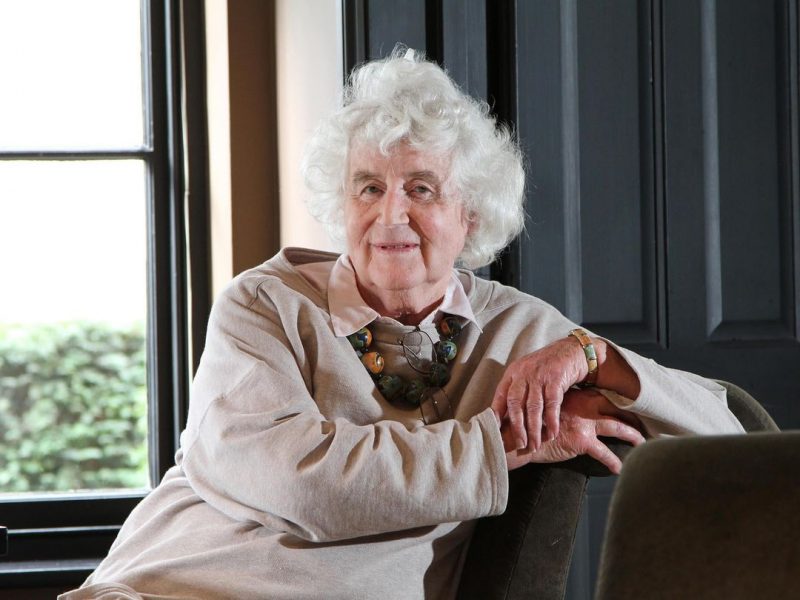
‘Her life story was crammed with romance, discovery and adventure. She was a soldier, an award-winning journalist, a novelist and – as a travel writer – became a poet of time and place.
She was also known as a pioneer in her personal life, as one of the first high-profile figures to change gender.’
So read one tribute to Jan Morris but my sympathies go to Northern Ireland journalist and writer Paul Clements who became a close friend of this remarkable woman and wrote the first full length study of her as a person and as a writer in his book entitled Jan Morris and published in December 1998.
‘It has been a life-long pleasure to read Jan Morris’s books, to write about her and to have visited her at her home in Llanystumdwy, north Wales with Elizabeth. A unique voice has fallen silent but many of her books will live on, perhaps for 100 years. Fourteen years ago, for her 80th birthday, I edited a Festschrift with contributions from 20 writers who spoke of her generous, playful, cerebral and fun side. A long life well-lived. Condolences to her family circle. Rest eternal.”
Paul introduced me to Jan when she attended Paul’s Burren book launch and she was charming and patient with the numbers of fans wanting her to sign his book. I enjoyed our chat, all too short but all so memorable.
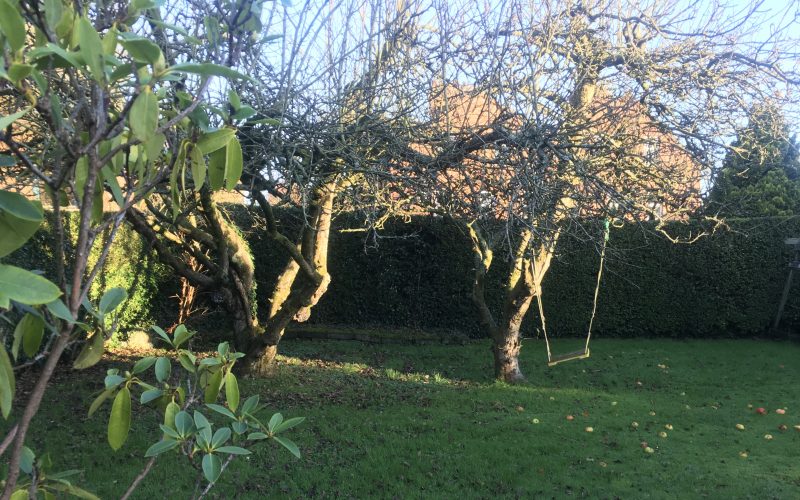
Autumn is giving way to winter. The apple trees are naked, the squirrels and the magpies are happily feasting on the windfalls and the swing hangs empty. Roll on spring. The buds are already forming which is a good sign and thanks to Garath the gardener we are all trimmed and perfect in preparation. Mind you, Stephen Watson has been busy in his garden. Even now full of colour!
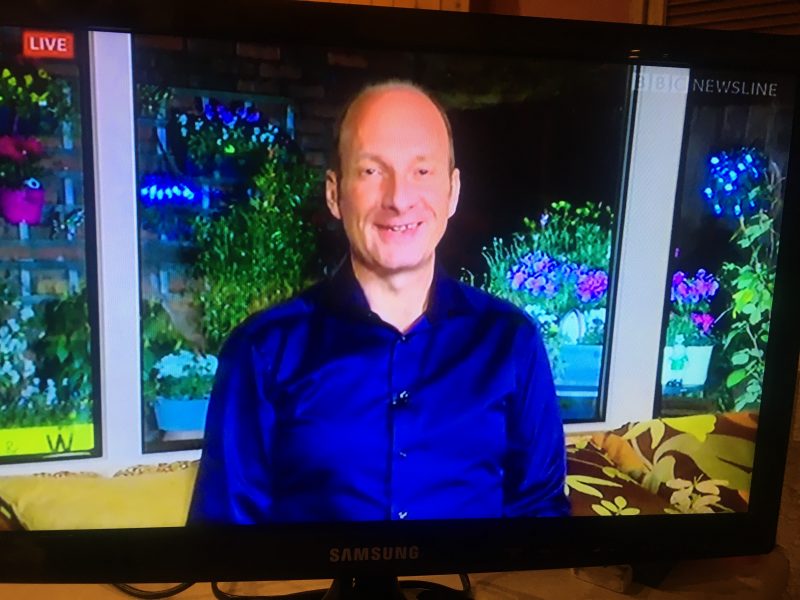
RESPECT – WHERE HAS IT GONE

Respect is in short supply apparently, so a recent report has claimed. Certainly before the lockdown I noticed a lack of personal contact amongst some of the young, and not so young, shop staff which I put down to stress. It doesn’t take much effort to say ‘thank you’ but that applied to both sides of the counter. I’ve seen women just lift their shopping and leave the checkout without a backward glance let alone an acknowledgement. I reckon training, or lack of it, is responsible. In general smaller shops do have the personal touch and there seems to be more time to chat.
Some time ago I had to take a pillow back to a large shop, problem was I’d bought a plastic container with two pillows but when I unpacked it that night there was only one inside. Next morning, back very early, explained to the young woman who said ‘do you want to go and get another set?’ I said no I want one of your staff to go and get me another set. ‘We’re short staffed I’m the only one here at the moment.’ So, off I went and got a replacement. I asked her why this could have happened. ‘Someone probably stole one out of the bag.’ She was less than interested asking me for my wee name, my wee address etc. I suddenly got very angry inside but retained my decorum! ‘Would it ever occur to you to apologise to me on behalf of your company. I’ve come a long way early in the morning because I was sold the wrong thing.’ She suddenly looked up from the till, looked me straight in the eye and said: ‘I am sorry, I am sorry you had to come back. I hope you will forgive us for the mistake,’ and her smile was genuine and lovely. She suddenly became a person opposite a person rather than someone going through the motions. I suspect no one had told her to always remember to leave the customer smiling! This is not a one off experience.
I’m getting quite brave at confrontation. Even challenged a woman who parked in a blue badge spot without a blue badge on show. I have one because of my two new knees and it makes a difference when I can open the car door to it’s full extent so I can get out. She came dashing out of the shop and our eyes met. I was polite but pointed out that having such a space is important to someone with a disabled badge but so often these are taken by drivers like her. She was suitable crestfallen.
REMEMBER WHAT IT WAS LIKE BEING A CHILD
When my grandson was about eight, we were sharing some up close and personal time together. “What age are you Granny?” he asked. I pointed out a gentleman never asks a lady her age. That didn’t wash. “You know we don’t have any secrets. What age are you?” My protests didn’t make any difference. Then the penny dropped. “Are you worried that I’m so old I might die?” That’s what it was all about, he, like me at his age, was frightened that his beloved grandmother would leave him. It was a wonderful opportunity to talk about death, to assure him I had no intensions of dying anyway soon but it wasn’t up to me and anyway even if I wasn’t around I would never leave him. That did the trick. That was 14 years ago and we’re still together and close as ever.
Children’s emotions don’t always come to the surface like that. They can fester inside a little head and heart and the result can be a child going through difficulties which appear to be destructive, sullen or challenging behaviour.

Now along comes Ollie and his Superpowers. Ollie is an imaginary seven year old boy from a single parent family. This doll is the brain child of Alison Knowles, a therapist in England initially working with adults but as parents started bringing children to her she realised her jargon was far from suitable so she created a new language and a special way to use it.
“I’d acknowledge the child but talk to Ollie who actually had the same issues as the little boy or girl.” She’d get the help she was offering Ollie all wrong and just as she thought would happen, the child suddenly got involved and told her what would or wouldn’t work for Ollie. This broke down barriers and the two formed a relationship where they could talk to each other about the most intimate concerns without embarrassment. It could take time but Alison discovered it worked. She would then tackle emotions, Oillie had them all, anger, happiness, sadness, fears, she made them visual, asking the child to draw their anger for instance, and so a discussion would begin using Ollie’s super power of learning to manage.
ALISON’S THEORIES ARE FASCINATING
She was so successful that there came a time when she couldn’t cope with demand so she wrote four books about Ollie for parents and then trained coaches to work all over the UK including here in Northern Ireland.
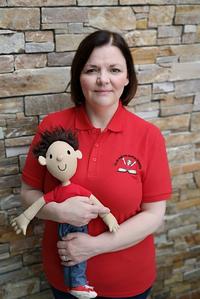
Avril Annett from Co. Down became the first coach in Ireland in May 2019. She worked as a mental health nurse, has four grownup children and a grandson who is five. Her youngest child was unhappy and anxious and had numerous suspensions from school for so called bad behaviour. “It was years before she received a diagnosis of Asperger’s. She wasn’t a bad child, I believe there is no such thing as a bad child, like all children she just needed to be understood.”
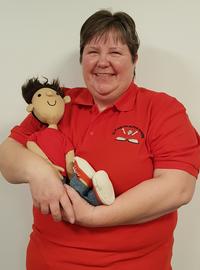
Moya Laird is our other Ollie coach also from Co. Down. She has two grown up children and three grandchildren and spent 20 years as a special needs classroom assistant and has been a holistic therapist for ten years. “Through Ollie and his Super Powers I now have the tools to empower not only our children and young people but their families too,”
They both work with children whose parents don’t fully understand their child’s challenging behaviour.
One little boy of nine was uncontrollable coming up to his return to school. With patience and understanding Avril built up a rapport with the boy, drew what his worries looked like, made up rhymes to help when these emotions began to take over. It took time but eventually the truth came out, the child was frightened, pressure in the classroom and bullying were hard for him to cope with, however, with her training and experience Avril was able to dilute the strength of the fear and, as his mother was sitting in on the zoom meeting, she too learned how to support him and manage her son’s emotions. Successful result.
Usually it’s face to face meetings but with the Covid situation it has to be zoom although children appear to like this and to them a natural way of communicating.
Moya visualises dealing with situations where children are covering up deep and troubling thoughts as a caterpillar gradually emerging as a butterfly in a process that is totally confidential and gentle. It might be using blocks of different colours, one colour for each emotion and so concentrating on each concern and dealing with it before moving on. Where necessary the parents will be advised of other specific professional organisations.
“If the child doesn’t want to talk that’s fine,” Moya tells me. “It might be a ten minute meeting over a few sessions until trust has been built up. Some might be shy and hide behind the peak of a base ball cap or keep looking down at a book on their knee but gradually they begin to take an interest and make eye contact then we form a relationship.”
FEAR TAKES MANY FORMS
It transpired that one ‘naughty’ little girl who was being truculent actually was very frightened that Santa Claus might get Covid and not be able to bring presents to boys and girls this Christmas; a five year old wanted Santa to give his magic to everyone to “fix the virus and make everyone safe.”
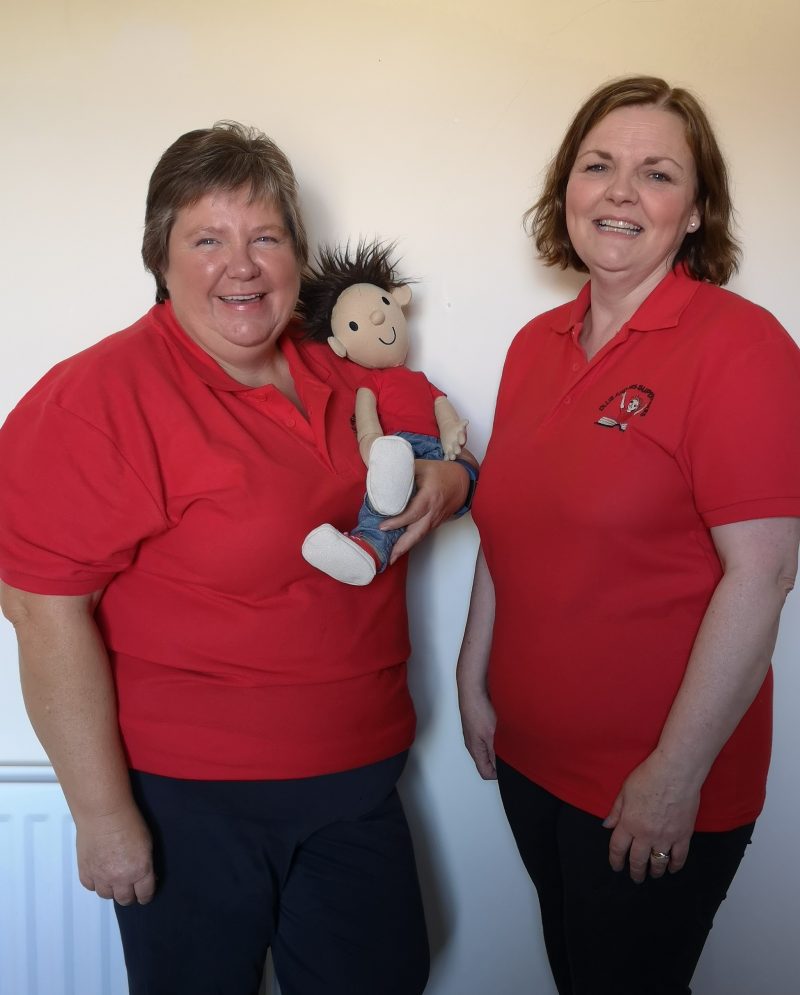
One thing is for sure, little minds work in mysterious ways and to have qualified caring coaches to tease out the underlying fear is a welcome service.
Moya has a lovely way of putting it. “It’s like the branches of a tree, every one is important to investigate until you come to the trunk where the issues are becoming obvious and then drilling down into the roots to fully understand.”
Hour long sessions cost £80 and group sessions can be arranged.
Details at www.ollieandhissuperpowers.com

DEAR KNOWS WHAT HE’LL BE UP TO NEXT. SCARY BISCUITS AS MY FRIEND WOULD SAY.
KEEP SAFE AND WELL.
